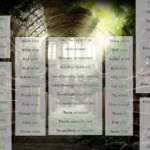Inisfree is a nexus of many realms, thus you’ll see and hear different languages spoken here. Just like most students in Europe, here ours get used to expressing themselves in more than one spoken and written language from a very early age, making it second-nature. “Communication is key”, after all, and we pride ourselves on being the best at it.
–
Table of Contents:
- Introduction
- Vocabulary
- Progression
- Major Languages Taught in Inisfree
- Languages We’ll Soon Offer
- Additional Notes
- Conceptual Images
–
Introduction:
While our Linguistics course teaches who languages developed, this Languages course of ours teaches the types of words and syntax in different modern languages, as well as how to speak the languages of the people/races allowed in our realm.
–
Vocabulary:
- accent
- accent-mark
- borrowed word
- consonants
- declarative
- dialect
- emphasis
- hyphenated
- imperative
- implied
- inflection
- interrogative
- language
- letter/character
- noun
- object
- prepositional-phrase
- pronunciation
- proper-noun
- pun
- punctuation
- Roman numeral
- root-word
- signed (for ASL, etc.)*
- silent-letter
- slang
- spoken
- subject
- tone
- tongue
- underscore
- verb
- vowels
- written
*We sign (ASL) not because deaf are in our realm (and none are deaf in our realm, BTW; we heal them all), but because it makes communication a lot better in these situations:
- in (extremely) loud areas, such as Outlander airports and construction sites
- when sneaking/hiding, such as in war zones
- underwater; during SCUBA dives, etc.
–
Progression:
General:
- conversational mastery of one’s own/first language
- learning about all the other languages
- elective language; just to try one/it out
- bilingual; fluency in at least two languages
- optional computer-programming languages
…
By School-year:
- English (since this is the first and official language of our founder and community)
- Latin (to make spotting potential roots of words in languages stemming from this one easier; pre-translation)
- Body Language
- Eye Language (not the high-speed one the Inisfreeans (ICVs) use, but what you can tell from what Outlander eyes are doing)
- ASL (not to be confused with “Age, Sex, Location”, a chatrooms abbreviation/request)
- Braille
- Romance (group of languages)
- Asian (group of languages)
- Basic in 18+ (starter-vocabulary of 18 languages), Poetry
- Elementary in 18+ (sentence fragments)
- Functional in 18+ (barely conversational)
- Proficient in 18+ (usually conversational, unless someone else is speaking quickly or making mistakes)
- Exodus (N/A; none taught by us, as students during this year typically are alone in the Outlands testing/applying all they have learned so far)
- Fluent in 18+ (able to understand nearly anyone except specialists using rare words/terms)
- Eloquent in 18+ (poetic in any/every learned language)
- Cultural Submersion (environments/settings where only the learned language is available to communicate in)
–
Major Languages Taught in Inisfree:
All of the ones spoken by millions of people on Earth are offered here;
- Arabic
- Chinese (Mandarin dialect)
- English
- French
- German (High)
- Italian
- Japanese
- Portuguese
- Russian
- Sanskrit
- Spanish
but, of course, any Inisfreean can teach anyone any language, as they are all omniglots.
–
Languages We’ll Soon Offer:
- Ana’kh (language of the Anunnaki)
- Angelic (sometimes called Enochian)
- Arcadian (of the Fae / Fay –though they speak Gaelic in the Highlands, and whatever other language humans use wherever they are)
- Asari
- Atlantean
- Bulgarian
- Demonic (Eredun dialect, the written form called Eredic)
- Djinn (a race of the Elementals species)
- Dovah / Drako (of the Dragons)
- Draconic (Dragon language subset, also used by Reptilians)
- Draenei (largely derived from Eredun)
- Elven/ish (Drow, Eldar (a.k.a. Aeldari, and its dialects from the 5 major Craftworlds), Quenya, Sindarin, etc.)
- Grey (telepathic math of the Greys –though they can telepathically communicate in the language of the abductee)
- Khalani (Protoss)
- Kryptonian (multiple dialects and alphabets/scripts)
- Lemurian
- Majesdanian
- Mayan (main/dominant dialect)
- Mer-folk/speak(e) (dialects of the North and South Atlantic, North and South Pacific, Indian Ocean, and the Mediterranean)
- Naga
- Norwegian (Bokmal is the written standard)
- Pleiadian (dialect of each of the allied Pleiadian worlds)
- Sevit (of the Seiliu)
- Sumerian
- Tamaranean
- Thanagarian
- (The) Green Language (based on empathic telepathy with non-human/oid animals)
- Ukrainian
- Valarin (of the Ainur; the language the Valar invented, perhaps the first language to exist)
- Valyrian (High)
- Vampiric (sounds Romanian/Slavic)
- Vanir
- Vulcan (High)
- and some for computer programming
–
Additional Notes:
While we offer numerous tongues here (pun not intended), this class only teaches how all of the above languages are currently spoken; we do not cover how or why they formed the way they did. That is for/in another of our classes.
…
English grammar tip: “Who vs Whom” (When to Use)
- He or she is who; if you can replace “who” with “he” or “she”, it is correct in that part of the sentence.
- Him or her is whom.
…
The 5 Inisfreean languages are only taught by request on an individual basis.
…
Apparent redundancies can imply new/modern/colloquial uses of terms;
“Cease and Desist” is redundant, according to those two words’ first/original definitions. “This is known as a “legal doublet”. It’s common in legal vocabulary perhaps because of the Norman Conquest over Anglo-Saxon England, and the wide adoption of Norman and French vocabulary into English.
Other cases include: “hue and cry”, “null and void”, “will and testament”, “free and clear”.”
However, the way it is meant is: “Cease” means “Stop.” and “Desist” means “Don’t start doing it again.”.
…
2024 May: English Tips
- Hard is the opposite of soft.
- Difficult (not hard) is the opposite of easy.
- Farther is about distance. (e.g. “That country is farther away than this one.”) — Further is about a concept. (e.g. “Let’s not take this any further.”)
- Forward vs foreword
- No “forwards” or “backwards”; those are made-up words; the “s” is pointless.
- Compliment (saying something nice) vs. complement (an angle that pairs with another angle to form a 180° arch)
- Correct (not right) is the opposite of incorrect/wrong.
- Right is only the opposite of left.
- Wrong: “how it looks like” — Correct: “how it looks”
- Synonyms of “and”: “also”, “as well”, “too” –thus it is redundant anytime someone forms a sentence with more than one of those; never say something such as, “And _, as well.” or “and also _.” because that is grammatically the same as saying “and _, and.” or “and and _.”.
- Never say “and yet” or “but yet”; if “yet” is in the sentence, you don’t need “and” or “but”.
- We place punctuation outside quotation marks when the abbreviation, word, or phrase being quoted does not include punctuation marks. For example, this is correct: FBI is the abbreviation of “Federal Bureau of Investigation”.
and this is not correct: FBI is the abbreviation of “Federal Bureau of Investigation.” (That sentence is incorrect because the period is not part of the meaning of “FBI”; FBI is not an abbreviation for a sentence. Even though Outlander-English teaches the opposite of this rule, this is how we write English in our logical system/realm.) - While vs. Whilst:
“While” is used to describe time and compare two things. “While” functions as a noun, verb, conjunction, or preposition in a sentence. “Whilst” is only used to describe the contrast between one thing and another. “Whilst” functions as a conjunction or preposition. - Among vs. Amongst:
In both speech and writing, “among” and “amongst” are interchangeable. Both are grammatically correct and mean the same thing. However, “amongst” is often considered old-fashioned or pretentious in American English, so some people may want to avoid using it.
–
–
Also see:
–



